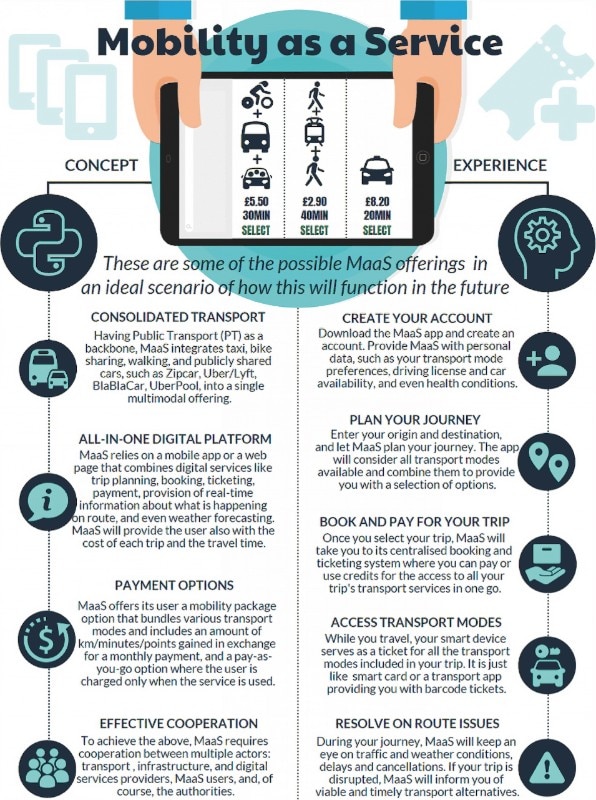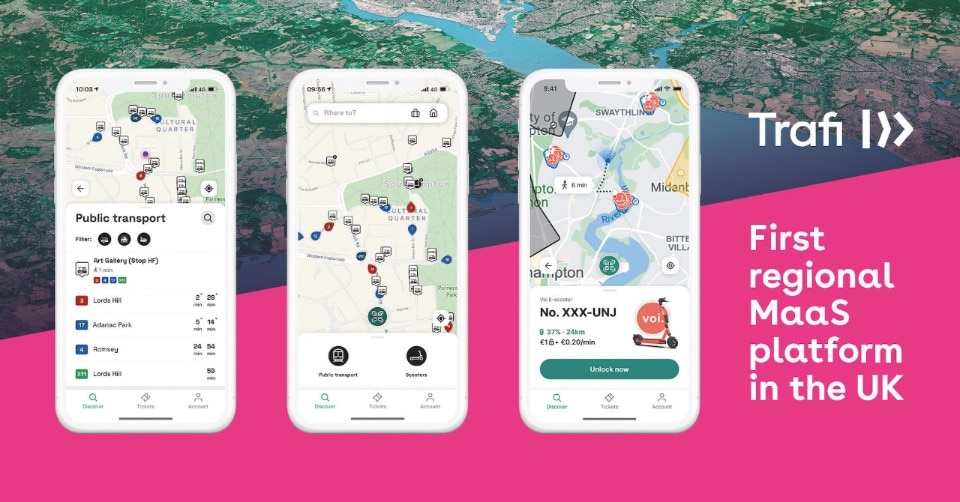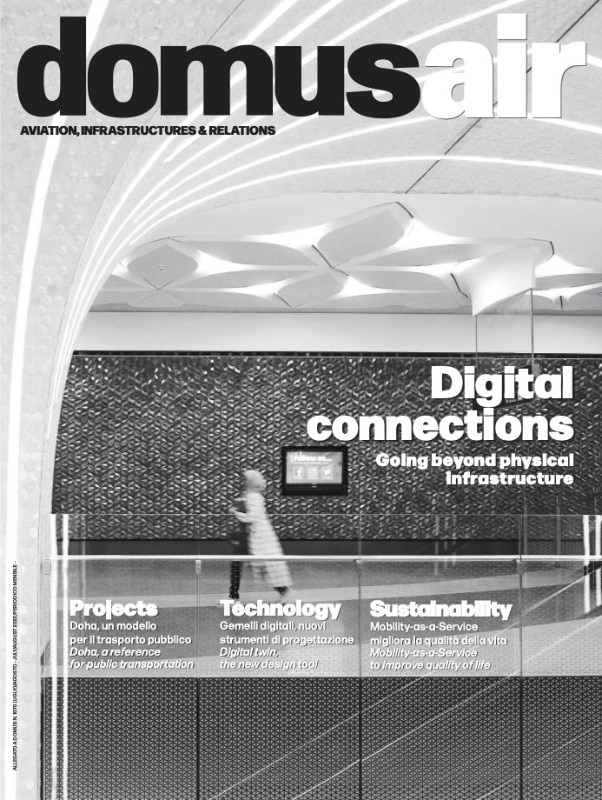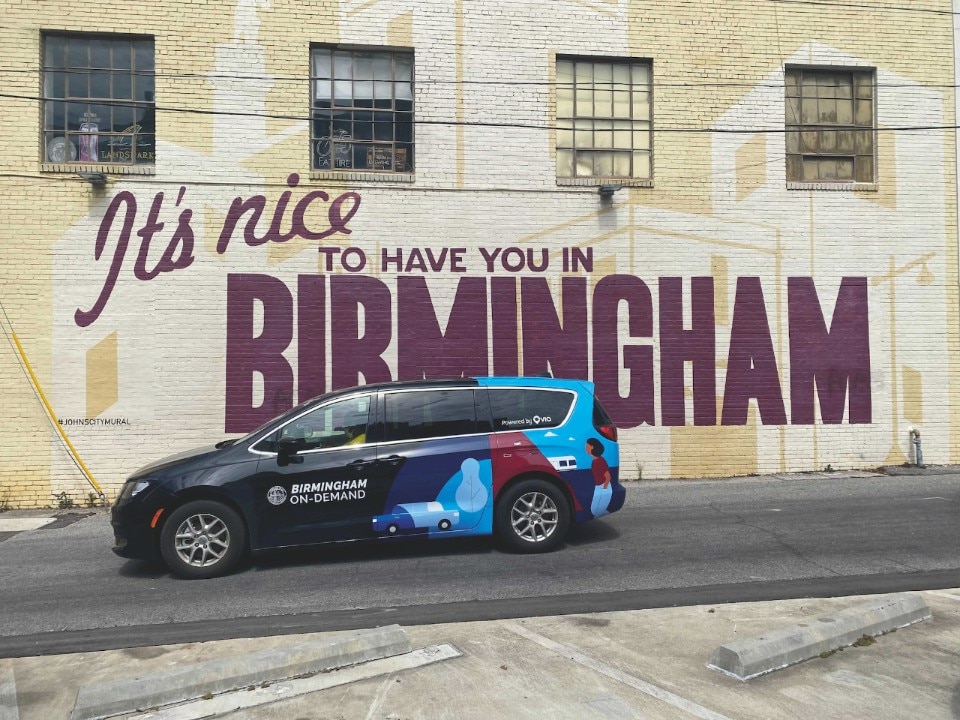Following an injury she received during volleyball practice, every Wednesday morning, before going to school, Chloe, a sixteen-year-old born and raised in Birmingham, Alabama, goes to a sports medicine center for an hour of physiotherapy. Chloe’s father works full-time for an insurance company and their neighbourhood is poorly served by public transportation. For years he has had to juggle his engagements with his daughter’s activities and with those of his son John. However, six months ago something changed in their city, and in their lives: a micro-transit service was implemented in Birmingham. Now, via app or telephone, it is possible to schedule personalized transport to any destination within the city at a cost of $1.50.
Part of a paradigm known as “Mobility-as-a-Service” (MaaS), the initiative allows Chloe and her brother John to move around the city efficiently and independently. Furthermore, the vehicle is a six-passenger van, ensuring a high level of security for users and an occasion to establish new social relations with people from one’s neighbourhood who are following a similar route.
This MaaS initiative is promoted by Via, a leader in on-demand public mobility that aims to transform transportation and logistics systems into highly efficient digital networks. The new service has had very positive effects on the city of Birmingham: access to work and healthcare has increased by 79%, while access to schools has increased by 85%.

Prior to this initiative, Birmingham was characterized by poor public transportation connections, which significantly limited access to workplaces for people without a car. And this in an economic situation that was already highly problematic, with 17% of the population having some long-term physical or mental disability.
When the first MaaS project was developed in Finland’s capital city, Helsinki, in 2017, many different areas, varying by geographic position and population density, enjoyed significant improvements in access to activities and services. MaaS services can be implemented in many ways depending on specific local needs. In Birmingham they involved incorporating new means of transportation, while in Helsinki they took the form of smart routers that map out fast, sustainable routes integrating different public and private transportation system already present in the area. MaaS services can fulfil a variety of functions, improving transportation both within the city and between more peripheral or rural areas and city-based or other services.
This system of smart transportation not only brings great social benefits, but also represents progress toward a more sustainable future, making ownership of a car no longer indispensable and not even the fastest and most convenient modal option.
It is forecast that by 2025, approximately 60% of the world population (4.5 billion people) will live in cities. How must the urban space be organized? Transportation systems clearly have a crucial role to play here. There will literally be no space for every citizen to have their own car in the cities of the future, nor can cars be the primary means of transportation. Imagining large-scale implementation of Mobility as a Service, CO2 emissions would be significantly reduced by people sharing a single vehicle, perhaps battery-driven and thus zero-emission. With incentives for sustainable mobility, many people would begin using services such as bike sharing and electric micro-mobility, obtaining numerous benefits in terms of physical health. There would also be gains for mental health, with a host of scientific studies showing a worsening of mental health, mainly as a result of stress, for people who have to spend moderate or long periods of time every day at the wheel of their car.
Furthermore, considering that cars are parked, on average, 95% of the time, a reduction in the number of private cars would restore a great deal of public space to the local community. Spaces that are now used as parking lots could be green parks and soft mobility paths in the future. Lastly, making use of MaaS systems, users will have a benefit also in terms of the quantity and quality of time spent travelling from one point to another.

Chloe and John now use Via services every day to reach their destinations. Chloe finally feels independent and free to move around in her city. John is overcoming his shyness and has made friends with another boy who, like him, takes the van every day to go to school. Their father now has more time for his own pursuits, which he has chosen to spend playing sports with his childhood friends. He is even considering selling his car, given the low cost of the Via-enhanced transportation system.
Like this family, many others in Birmingham and everywhere that MaaS initiatives have been implemented have seen a boost in their quality of life. In a sustainable future (in the most holistic sense of the term), people will no longer have to shape their lives around the necessity of a car. The breaking of this bond can have hugely beneficial environmental, social, and economic outcomes. It will be possible to reduce air and noise pollution, promote flexible, healthy independent mobility, free up quality time in our everyday lives, and significantly increase connections and access to services and activities in every zone of the city and its environs.

Opening image: the micro-transit service implemented in Birmingham, Alabama. The vehicle is a six-passenger van, ensuring a high level of security for users and an occasion to establish new social relations with people.


